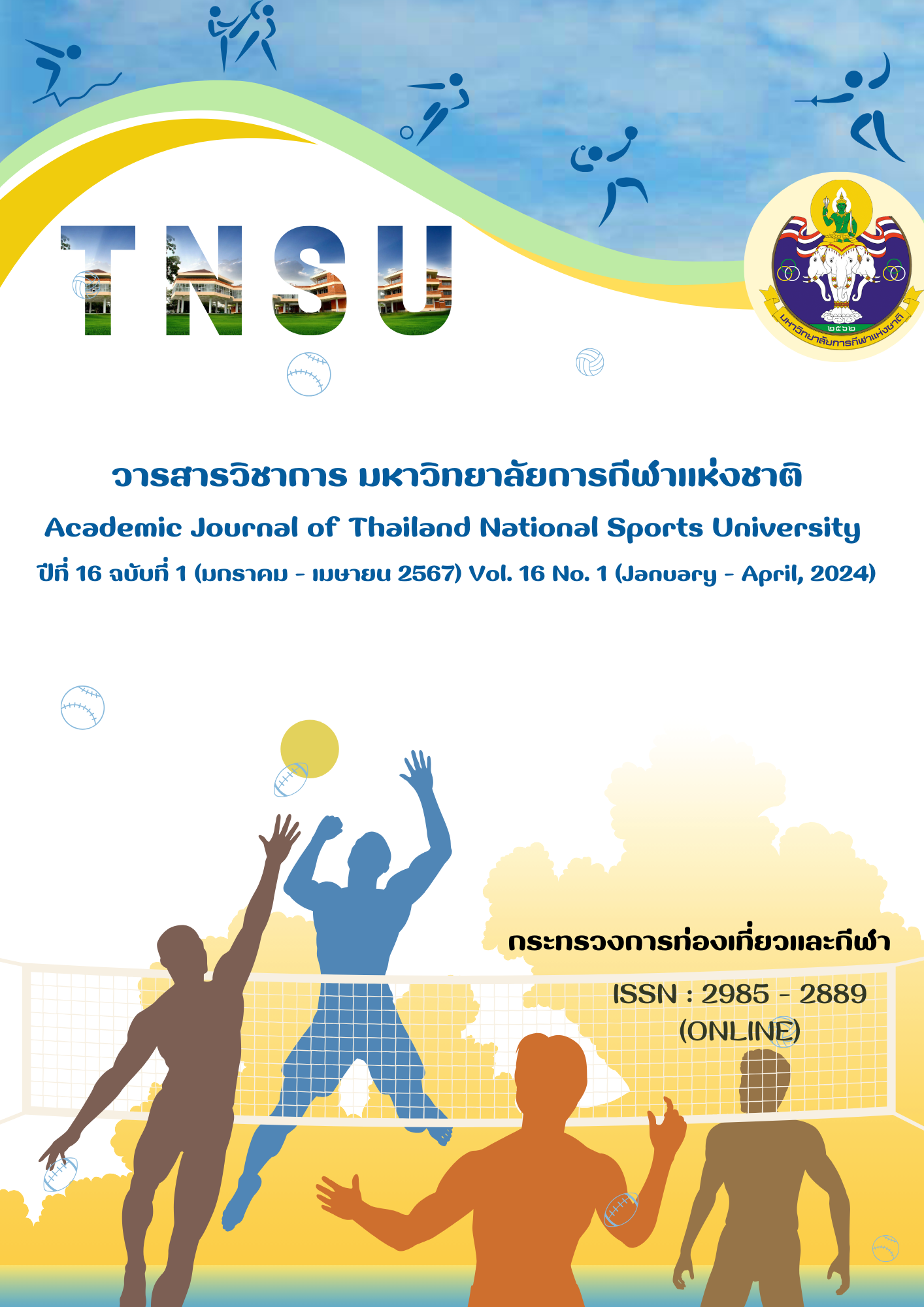COMPETENCE OF SUCCESSFUL ATHLETES IN OLYMPIC GAMES
Main Article Content
Abstract
The purpose of this research was to investigate the competence of successful athletes in Olympic Games. It was designed in a qualitative research method. The semi- structured interview was used as the research instrument, the content validity of which was found at 0.93, and the reliability of which was found at 0.80. The research instrument was also improved before data collection. The in-depth interview was conducted with eight key informants by purposive selection. The data analysis was based on competence concept of McClelland, and theoretical research framework, and conducted by a focus group method with a panel of seven experts for reviewing appropriateness, feasibility and expected benefits.
The findings revealed that the competence of successful athletes in Olympic Games, which was considered very important for heightening the athlete’s potential and ability to achieve the international level consisted of five components, Motivation, Qualification, Opinion about Oneself, Knowledge and Skill.
The research results would be beneficial to all stakeholders in sports such as sports associations of Thailand, sports clubs, team managers, coaches, athletes and sports scientists as the guidelines for recruitment and selection of new athletes, and development of athletes’ potential in order to meet the competence of successful athletes in Olympic Games.
The research suggestions showed that specification of behaviors complying with the aforementioned five components of competence should be indicated so as to construct the criteria of indicators for athlete’s competence assessment, Moreover, the factors affecting successful athletes in Olympic Games should be investigated to make a plan for developing athletes to meet each component of competence.
Article Details

This work is licensed under a Creative Commons Attribution-NonCommercial-NoDerivatives 4.0 International License.
The published article is a copyright of the Academic Journal of Thailand National Sports University. The passage appeared in each article in this academic journal is a perspective of each author which is not related to the journal. Each author is required to be responsible for all components of his/her own article. If there are any mistakes, each author must be responsible for those mistakes on his/her own.
References
Anan Atchoo. (1993). Sports competence. Retrieved from https://ejournals.swu.ac.th/ index.php/ENEDU/article/view/6072/5705
Anek Thipparak. (2003). Guidelines for development of Thailand’s national football team for excellence in the next decade (2002 - 2012) (Master’s thesis), Srinakharinwirot University.
Chalerm Chaiwatcharaporn, Boonsak Lorphitak, & Chaiyasit Phawilat. (2009). A study on factors of success in sport expected to win for Thailand: Amateur boxing. Bangkok: Chulalongkorn University.
Chattrakul Panuthai. (2020). Sports Psychology. Suphanburi: Thailand National Sports University.
Choosak Phattanamontri. (2008). Experience in using sports psychology for Olympic players of Thailand: Construction of theory from information (Doctoral dissertation), Burapha University.
McCrae, R. R., & Costa, P. T. (1997). Personality trait structure as a human universal. American Psychologist, 52, 509 - 516.
McClelland, D. C. (1973). Test for Competence, rather than intelligence. American Psychologists, 17(7), 57 - 83.
Ministry of Tourism and Sports. (2023). National sports development plan, volume 7 (B.E. 2566 – 2570). Bangkok: Office of the Permanent Secretary, Ministry of Tourism and Sports.
Office of the Constitutional Court. (2021). Constitution of the Kingdom of Thailand, B.E.2560 (4th ed.). Bangkok: Office of the Constitutional Court.
Office of Commission on Economic and Social Development. (2019). Twenty - year national strategy (B.E. 2561- 2580) (8th ed.). Bangkok: Office of Commission on Economic and Social Development.
Prasobchai Kaewrungrueang, Orapin Piyasakulkait, Wichai Thosuwanjinda, Pakorn Priyakorn, Rungson Prasersri, & Phrapaladsura Yanatharo (Juntuek). (2021). The excellence competency development of swimming athletes of Thailand Swimming Association. Journal of Local Governance and Innovation, 5(1), January - April. 79 - 90.
Ratchanee Khwanboonchan. (2004). Research report: Making a development plan on sports for excellence. Bangkok: Sports Authority of Thailand.
Rovinelli, R. J., & Hambleton, R. K. (1997). On the use of content specialists in the assessment of criterion-referenced test item validity. Dutch Journal of Educational Research. 2(2), 49 - 60.
Sakul Changmai. (2003). Data collection, data management and qualitative data analysis. Christian University Journal, 9(3), 164 - 173.
Sakkaphat Ngam - ek. (2021). Personality and performance in sports competition. Retrieved from https://smarterlifebypsychology.com/2021/11/25/personality-performance-sport
Supitr Samahito. (1995). Relaxation. Bangkok: Faculty of Education, Kasetsart University.


